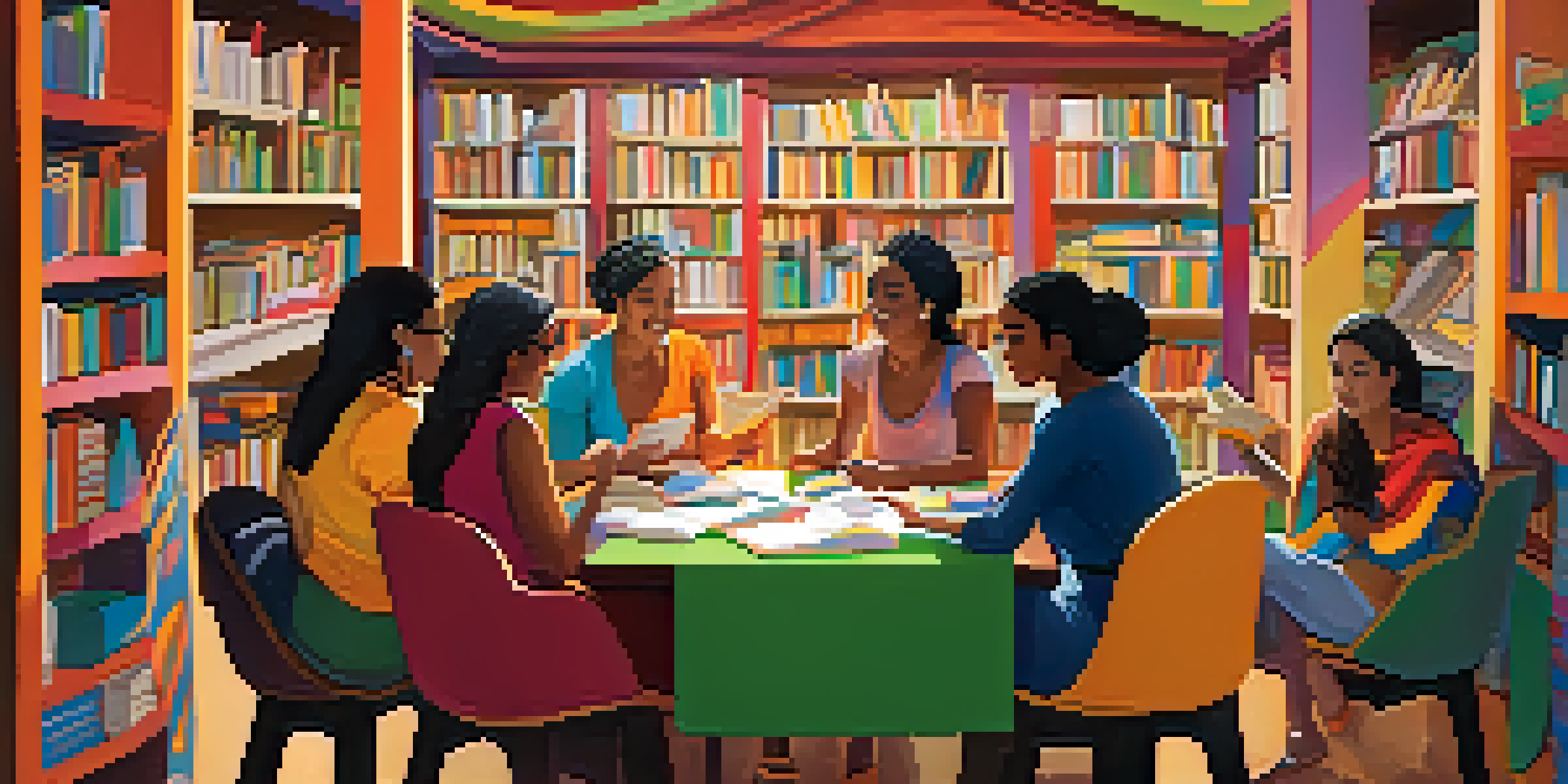Brazil’s Female Authors: Celebrating Their Voices

The Rich Tapestry of Brazilian Literature
Brazilian literature is a vibrant tapestry woven from diverse voices, with female authors playing a pivotal role in its evolution. These writers often draw from their unique experiences, reflecting the complexities of Brazilian society. From historical narratives to contemporary fiction, their works resonate with readers both locally and globally.
Literature is a way of life, and it reflects the lives of those who create it.
The literary landscape in Brazil has seen a remarkable shift as women writers gain recognition for their contributions. Their stories often challenge societal norms and give a voice to the marginalized. This rich body of work not only entertains but also educates, fostering a deeper understanding of Brazil's cultural fabric.
As we celebrate these authors, it’s essential to recognize their influence on future generations of writers. Their resilience and creativity inspire countless women and girls to pursue their own literary ambitions. In doing so, they continue to shape the narrative of Brazilian literature.
Notable Female Authors Who Changed the Game
Among the luminaries of Brazilian literature is Clarice Lispector, whose introspective prose delves into the human psyche. Her groundbreaking works, such as 'The Hour of the Star,' explore themes of identity and existence, making her a timeless figure in literature. Lispector's unique voice paved the way for many contemporary female authors.

Another significant figure is Adélia Prado, known for her poetry that beautifully intertwines spirituality and everyday life. Her writing is deeply rooted in her experiences as a woman in Brazil, offering a fresh perspective that resonates with many readers. Prado's ability to capture the essence of the mundane elevates her work beyond mere storytelling.
Female Authors Shape Brazilian Literature
Women writers in Brazil significantly influence the literary landscape, reflecting the complexities of society and inspiring future generations.
These authors, alongside others like Marina Colasanti and Conceição Evaristo, have enriched the literary scene with their powerful narratives. They highlight the importance of women's voices in literature, encouraging dialogue about gender and cultural identity. Their legacies continue to inspire new writers to explore their own stories.
Themes of Identity and Feminism in Brazilian Literature
Identity is a recurring theme in the works of many Brazilian female authors, often reflecting their personal struggles and triumphs. They explore the intersections of race, class, and gender, creating narratives that resonate with a wide audience. This exploration allows readers to engage with complex issues in a relatable way.
The role of women in literature is to create a narrative that speaks to the essence of life.
Feminism in Brazilian literature is not just a theme; it's a movement. Female authors challenge traditional gender roles, pushing for greater representation and equality. Their works often serve as a rallying cry for women to assert their rights and redefine their place in society.
Through their storytelling, these authors invite readers to reflect on their own identities and experiences. They encourage a deeper understanding of the societal norms that shape our lives, making their literature not only relevant but transformative. This powerful blend of personal and political is what sets their works apart.
The Role of Cultural Heritage in Their Writing
Brazil's rich cultural heritage significantly influences its female authors, infusing their narratives with local traditions and values. Many of these writers draw inspiration from folklore, music, and the vibrant history of their communities. This connection to culture adds depth to their storytelling and resonates with readers across generations.
By weaving cultural elements into their work, these authors preserve and celebrate their heritage. Their stories often reflect the struggles and joys of everyday life in Brazil, creating a bridge between the past and present. This cultural grounding allows readers to engage with the characters in a meaningful way.
Cultural Heritage Enriches Narrative
Brazilian female authors incorporate local traditions and values into their storytelling, creating a deep connection with readers across generations.
Moreover, the incorporation of cultural heritage fosters a sense of pride among readers and writers alike. It creates a shared experience that transcends individual stories, uniting people through the common threads of their backgrounds. This celebration of culture is a vital aspect of Brazilian literature.
Emerging Voices: The Next Generation of Female Authors
As the literary landscape in Brazil evolves, new voices are emerging, bringing fresh perspectives and innovative storytelling techniques. Young female authors are increasingly finding platforms to share their work, often drawing from social media and self-publishing. This democratization of literature allows for a wider array of narratives to flourish.
These emerging writers are not afraid to tackle contemporary issues, including mental health, LGBTQ+ rights, and environmental concerns. Their willingness to address these topics resonates with younger audiences, fostering a new wave of engagement with literature. This shift reflects the changing societal landscape in Brazil.
By celebrating these new voices, we acknowledge the continuous evolution of Brazilian literature. The future looks bright as these writers challenge conventions and push boundaries, ensuring that women’s perspectives remain central to the literary conversation. Their contributions will undoubtedly shape the future of literature in Brazil.
Literary Festivals: A Platform for Female Voices
Literary festivals across Brazil serve as vital platforms for female authors to showcase their work and connect with readers. Events such as the Flip (Festa Literária Internacional de Paraty) highlight the importance of diversity in literature. These gatherings celebrate female authors, fostering discussions that amplify their voices.
At these festivals, authors have the opportunity to engage directly with their audience, allowing readers to forge personal connections with their favorite writers. Such interactions can be transformative, inspiring readers to explore new perspectives and delve deeper into their works. This engagement enriches the literary community as a whole.
Emerging Voices Transform Literature
New female authors are addressing contemporary issues through innovative storytelling, ensuring that diverse perspectives remain central to Brazilian literature.
Moreover, these festivals promote collaboration among authors, creating a supportive network that encourages creativity and innovation. The celebration of female authors at these events not only elevates their status but also reinforces the importance of representation in literature. It's a testament to the thriving literary culture in Brazil.
The Importance of Support and Representation
Support for female authors in Brazil is crucial for fostering a vibrant literary community. Initiatives aimed at promoting women's writing, such as mentorship programs and writing workshops, empower aspiring authors to share their stories. This support system helps to level the playing field in a historically male-dominated industry.
Representation in literature matters because it shapes how stories are told and whose voices are heard. When women see themselves reflected in literature, it validates their experiences and inspires them to pursue their own writing. This representation fosters a sense of belonging and encourages diverse storytelling.

By championing female authors, we contribute to a more inclusive literary landscape. This not only enriches the reading experience for everyone but also ensures that future generations of writers feel empowered to share their narratives. Supporting these voices is essential for the continued growth of Brazilian literature.